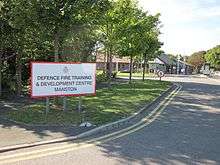Defence Fire and Rescue Service

The Defence Fire and Rescue Service (DFRS) is the primary firefighting and rescue service protecting British defence estates and property. Along with the Royal Air Force Rescue and Firefighting Service, it forms the Ministry of Defence Fire Services.
History
The Ministry of Defence Fire Service was formed on 1 April 1991 by the amalgamation of the Navy Department Fire Prevention Service, Army Department Fire Service, Air Force Department Fire Service and Procurement Executive Fire Service. It was later renamed the Defence Fire Service. It was a civilian organisation which protected mainly domestic sites at RAF, Army and Navy installations.
It later became part of a similarly named umbrella body, the Ministry of Defence Fire Services, which also included the RAF Firefighting and Rescue Service, a military organisation which protected mainly RAF airfields and runways.
The Defence Fire Service was renamed the Defence Fire and Rescue Service in 2004 following the introduction of the Fire and Rescue Services Act. The Act, among other things, acknowledges that Fire Brigades in the UK do more than just simply fight fire. Most UK Brigades changed their names from Fire Services to Fire & Rescue Services during this period. The name change only applies to the civilian fire service, the Royal Air Force Fire Service still remains a separate organisation.
In 2014 the Defence Fire Risk Management Project began to look at outsourcing to a private contractor. It was announced in November 2015 that this is the recommended option. Bidders still in the "competition" are Serco and Capita.
Firefighting and rescue
Both civilian and RAF fire crews are trained in exactly the same way. The training is in line with their local authority fire service counterparts. Traditionally RAF crews were specialists skilled at dealing with live aircraft munitions and airfield crash rescue operations, but they also provided Fire Prevention and Domestic firefighting response on RAF bases and assisted local civilian brigades when called upon. There was, also, often a cross over of roles with civilian Defence Fire Service crews protecting some air bases, and RAF crews protecting purely domestic (non-flying) units.
In the RAF, airmen and women receive their basic military training before going on to train in various "trades" or "areas of expertise" such as mechanics, pilots, electricians, navigators, etc. Firefighting is a "trade" therefore which some airmen/women choose to be trained in.
The main training facility for all MOD firefighters is the Defence Fire Training and Development Centre (was FSCTE) at the former RAF Manston in Kent. Originally the Air Ministry Fire Training School, in 2007 DFTDC became part of the newly created Defence Fire Risk Management Organisation (DFRMO) at Andover, under the command of HQ Land Forces.
"Over the fence" response
As a general rule the Defence Fire and Rescue Service only operate within the confines of the site it is protects. However it is a fire service recognised by the Fire and Rescue Services Act 2004 and as such it has jurisdiction and powers of entry just like any other local authority fire service at incidents involving fire or risk to life. As such there are often local agreements for MoD fire services to cover a certain area around the site they protect and can be called for assistance by their local authority fire service colleagues as and when required.
Other responsibilities
The new MoD fire service is a Fire Authority in its own right,citation required, and is a statutory authority for the purpose of enforcing fire safety standards (The Regulatory Reform (Fire Safety) Order 2005) at all defence sites. .